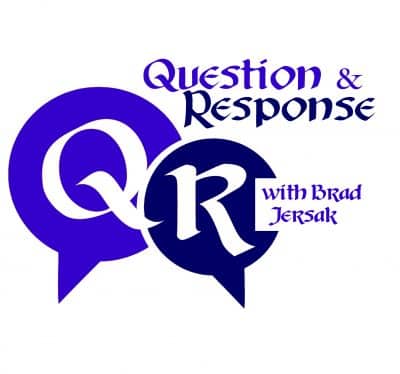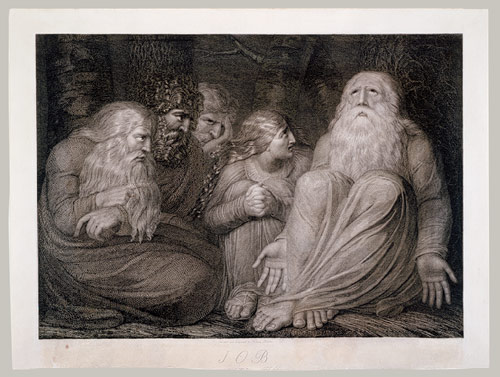The Gospel According to A.I.* by Brad Jersak
The Gospel According to A.I.* (*Artificial Intelligence)
Well, I didn’t see that coming! For decades, science fiction has forecast the possibilities and perils of artificial intelligence, from do-it-all Jetsons maids to Terminator robots arising to wipe out the human race. But in real life, the sheer speed of online A.I. advances today are outpacing our ethics and promise to render my analysis obsolete even before I can blink—a quaint relic from yesterweek.

I was relatively early to the game of computer-generated images (and their copyright issues). The basic concept is that you feed a verbal description into one of the many “apps” now available and the program tries to create what you want.
On my smartphone, I wrote, “Make a crucifixion scene with radiant light in cubist style.” In half-a-minute, it produced four samples to choose from, including the image to the left. The A.I. program also allows you to add more specs or switch themes… I could ask, for example, to include other figures (Jesus’ mother, a few disciples and the Roman centurion) and styles (e.g., paint it as a van Gogh or Picasso).

Another minute and I got four more samples. Once you get the hang of it, the better (more expensive) versions can be very playful. For example, when fake photos of “Pope Francis as a gangsta” went viral (see image, created by Pablo Xavier, a 31-year-old construction worker in Chicago), they even fooled some people into believing they were real. And that gets quite dangerous when you can produce hi-definition “deep fake” videos of political leaders parroting anything you want or in compromising situations. We’re already there.
You may have also heard about “ChatGPT,” just one name brand among a proliferation of A.I. writing tools. Again, users can load in a request and, using “predictive text” and almost limitless internet content, your A.I. assistant will respond at light speed in countless ways.
For example, I can ask it to summarize any book or topic online, create a summary, add subheadings, and compose it in any style (from Shakespearian poetry to fifth grade reading level). I can ask it to create a bibliography of twenty books or articles on any subject and present it correctly any academic style. Teachers need to beware because students can even ask it to write essays for them… and likewise, teachers can use A.I. to detect A.I. essays!
There’s no end of help—but sometimes A.I. seems so eager to please that it can make up completely incorrect information, including books that don’t exist, biographies (including mine) with false facts and serious omissions, or sermons loaded with heresy. In fact, I chatted with two professors at a major seminary who had just read an A.I. homily. The first prof said, “Wow, it pretty much nailed it!” while the second prof grumbled at how completed misguided it was. Lesson: always proofread everything and never take off your critical thinking cap!
I decided to test out A.I.’s writing skills for myself. I asked, “Please write a 300-word description of toxic religion and how faith in Jesus overcomes it.” [Note: I always say please]. In twenty seconds (seriously!), here is what came back… please, read carefully and critically!
A.I. on Toxic Religion and Faith in Jesus
Toxic religion refers to any belief system or religious practice that harms an individual’s mental, emotional, and physical well-being. While religion can bring comfort, hope, and guidance to many people, toxic religion can cause immense damage, including anxiety, guilt, shame, and trauma.
Toxic religion can manifest in various ways, such as rigid dogma, extremist views, intolerance, shaming, and controlling behavior. This type of religion tends to emphasize fear, punishment, and condemnation, rather than love, forgiveness, and acceptance. Toxic religion often prioritizes adherence to rules and traditions over personal growth, authenticity, and compassion.
Faith in Jesus can overcome toxic religion by promoting a healthy and transformative relationship with God. Jesus’ teachings emphasize love, compassion, and forgiveness as the core of his message. Jesus teaches that all people are created equal and should be treated with dignity and respect. He also emphasizes the importance of self-reflection, humility, and empathy towards others.
Moreover, faith in Jesus can provide a sense of purpose, meaning, and hope to those who struggle with the effects of toxic religion. Jesus offers a path to healing and restoration through his message of grace, forgiveness, and redemption. He shows that God is not a harsh judge but a loving father who seeks to reconcile with his children.
In essence, faith in Jesus offers a liberating alternative to toxic religion by emphasizing a relationship with God that is rooted in love, grace, and compassion. It encourages individuals to embrace their humanity and work towards becoming their best selves, rather than conforming to a narrow set of beliefs and practices. Through Jesus’ teachings, people can find the strength and courage to overcome the negative effects of toxic religion and embrace a life of peace, joy, and purpose.
PTM’s Critical Analysis
How did you feel as you read that? What were your impressions? First, credit where it’s due: A.I. delivered a 286-word article. If only Laura, our managing editor, could count on such conformity to word-limits from her human colleagues!
Second, in my opinion, the content was as good as anything I’ve read on the topic, partly because it relies on key words to dig up information online. It can’t create anything out of personal experience or from the heart. It compiles content written by living experts. I can’t prove it, but given the specific wording in my request, I have a sneaking suspicion Greg Albrecht and the PTM.org resources page provided source material.
In any case, I found its presentation so clear, concise and on target that I wish we could hear this perspective from more Christian pulpits. If every preacher and teacher in every church and seminary were convinced of this A.I.’s perspective, I’d be happily out of a job. It’s a beautiful corrective and more Christ-centered than the centuries of bad religion CWRm is trying to overcome.
Impressed, I forwarded the piece to Greg (whose A.I. biography was also botched). I found his responses poignant.
Greg’s first reaction was that the article was so near-perfect that it could feel like a sucker-punch to the ego! It’s like comparing beach photos of oneself to images of models whose wrinkles and bulges have been airbrushed away! Fair point, I’d say!
Second, he noticed that like Spock of Star Trek, the piece lacks emotional connectivity—the empathetic glue needed to cement relationships. Agreed. Indeed, because of this, one can develop a feel for discerning A.I. pieces more quickly than you’d expect. Even when it gets its facts right, A.I. can still lack a palpable human quality… though if you ask for it, who knows?
And finally, I love Greg’s final point: “In order for Chat to spew out the 300 words, Brad had to frame and ask the question. Asking a question: being willing and able to perceive and articulate a question remains a human trait, virtue or flaw, depending. The striking lesson for me is less about how good Chat is at answering questions, but how adept we are at asking them… and not just into an A.I. assistant.
In a surprising turn, writing this article focused my attention on the quality of human queries… to myself, to people I relate with, to the world around me, to God and to Scripture. Maturity moves beyond questioning (the cynic), spouting leading questions (“Don’t you think…”) or failing to ask at all (know-it-alls). My foray into the A.I. era reminded me of the value of human curiosity, of open-minded research, well-framed questions, and an ear for detail. It showed me not to believe everything I read, the need to fact-check, and to give credit to whom it’s due. Most of all, it reminded me that beyond getting the facts right, humans need to connect on a heart level, where “How are you really doing?” matters far more than “Do you agree with me?”
Homework for those who are curious: Jesus asked questions throughout the four gospels. It should be easy enough to ask a Chatbot, “Please list every question that someone asked Jesus in the four Gospels.”
Then what if we asked it those questions? For example, “Who is my neighbor?” or “What is truth?” But even better, I wonder how it would answer Jesus’ questions! “Who do you say that I am?” or “When the Son of Man returns, will he find faith in the earth?” Just for fun.










 Plain Truth Ministries | Box 300 | Pasadena, CA 91129-0300
Plain Truth Ministries | Box 300 | Pasadena, CA 91129-0300

